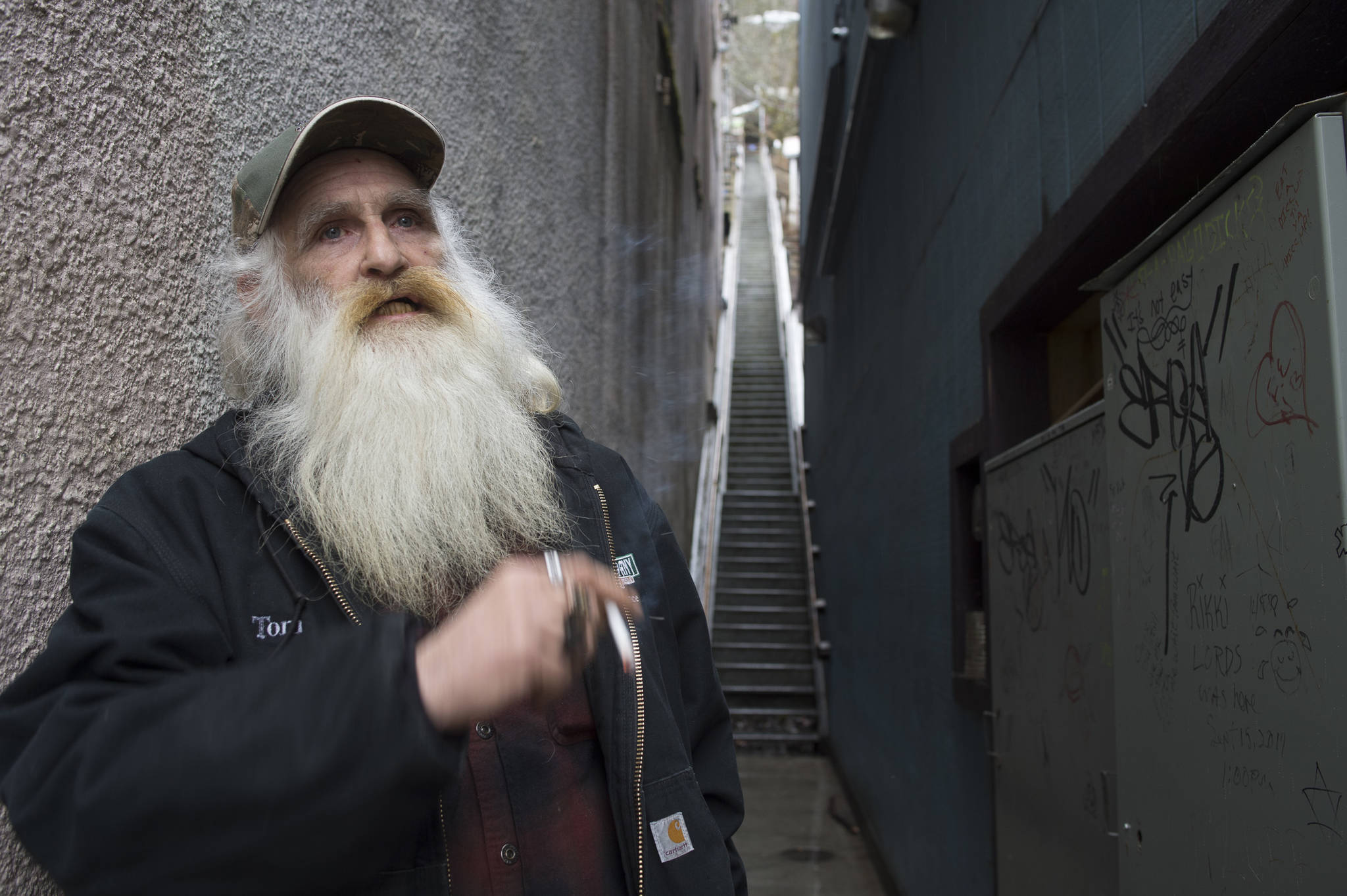Dave Bonilla has lived in homeless shelters all over the country, from Georgia to California.
Since August of last year, he’s lived at the Glory Hall Homeless Shelter in Juneau. As Bonilla, 57, sat in his regular chair near the front door of the shelter Friday morning, he said the Glory Hall is “a hell of a lot better” than any shelter he’s lived in.
In a few months, the Glory Hall might have to close its doors for at least part of the week. Gov. Mike Dunleavy’s proposed budget would slash funding for four key programs that help fund organizations fighting homelessness. According to research by the Alaska Coalition on Housing and Homelessness (ACHH), that would put about 50 organizations around the state — including the Glory Hall and Housing First in Juneau — in grave danger of closing.
“They’re looking at numbers, and not the people,” Bonilla said of the budget. “They’re not looking at the big picture of what happens when you take that money away.”
Funding for the Homeless Assistance Program (HAP) will drop from $7.8 million to $950,000, according to ACHH. The Special Needs Housing Grant (SNHG) program will be cut from $1.7 million to $200,000. The Human Services Community Matching Grant (HSCMG) and Community Initiative Matching Grants (CIMGP) programs will be totally eliminated, taking $2.2 million away from shelters and food services. In total, according to ACHH, that would be a cut of nearly $11 million to homelessness services around the state.
Juneau organizations in particular — Gastineau Human Services, Glory Hall, Juneau Cooperative Christian Ministry, Juneau Housing First Collaborative and REACH — that benefit from those four programs would lose about $1.3 million. This would be a crippling blow to these organizations, Glory Hall Executive Director Mariya Lovishchuk said.
The Glory Hall, which has served Juneau’s homeless since 1982, would lose about $150,000 (more than 20 percent of its overall funding), Lovishchuk said. That means the shelter would have to cut down on the number of days it operates or just close down for months at a time.
The cut to Housing First — a 32-unit housing facility that provides a place to stay for some of Juneau’s most vulnerable residents — would be even more dramatic. Lovishchuk (who is also on the board for the Juneau Housing First Collaborative) said Housing First will lose almost 95 percent of its funding. Lovishchuk didn’t hold any punches in an email to the Empire about the possible future of Housing First.
“If the governor’s budget passes, the project will close and all of the residents will become homeless again and will probably die on the streets,” Lovishchuk said. “All of the progress made to reduce emergency service utilization and suffering will be lost. We will end up paying still, through emergency rooms, jails, trauma generated by finding our friends, neighbors, and relatives dead under bridges.”
It will be challenging for those at the Glory Hall to find places to go.
ACHH Executive Director Brian Wilson said closing down shelters would have a major impact on public safety as well. Housing First, for example, has cut down on the number of emergency calls and hospital visits, according to a study from the University of Alaska Fairbanks.
Bonilla said he expects to see crime increase with people out on the streets in need of ways to get food without the shelter available.
“You take that money away, and you’re basically saying, ‘We want more crime,’ because that’s what’s going to happen,” Bonilla said. “They don’t realize that.”
Homelessness around the state has been rising in Juneau and the state as a whole in recent years. In the 2018 Point in Time Count (an annual head count of those living on the street) showed that there were 235 homeless people in January 2018, an increase of 20 people from the count in 2017.
Bonilla, who came up to Alaska last year to try and take advantage of the hunting and fishing resources in the state while living his minimalist lifestyle. As he sat by the front window of the Glory Hall on Friday morning, he pointed to the rising homeless rates in the state.
“They’re talking about the homeless problem that they have now on the streets … as being a problem,” Bonilla said. “Well, guess what’s going to happen if that bill passes? Everybody here is going to be on the streets.”
• Contact reporter Alex McCarthy at amccarthy@juneauempire.com. Follow him on Twitter at @akmccarthy.

